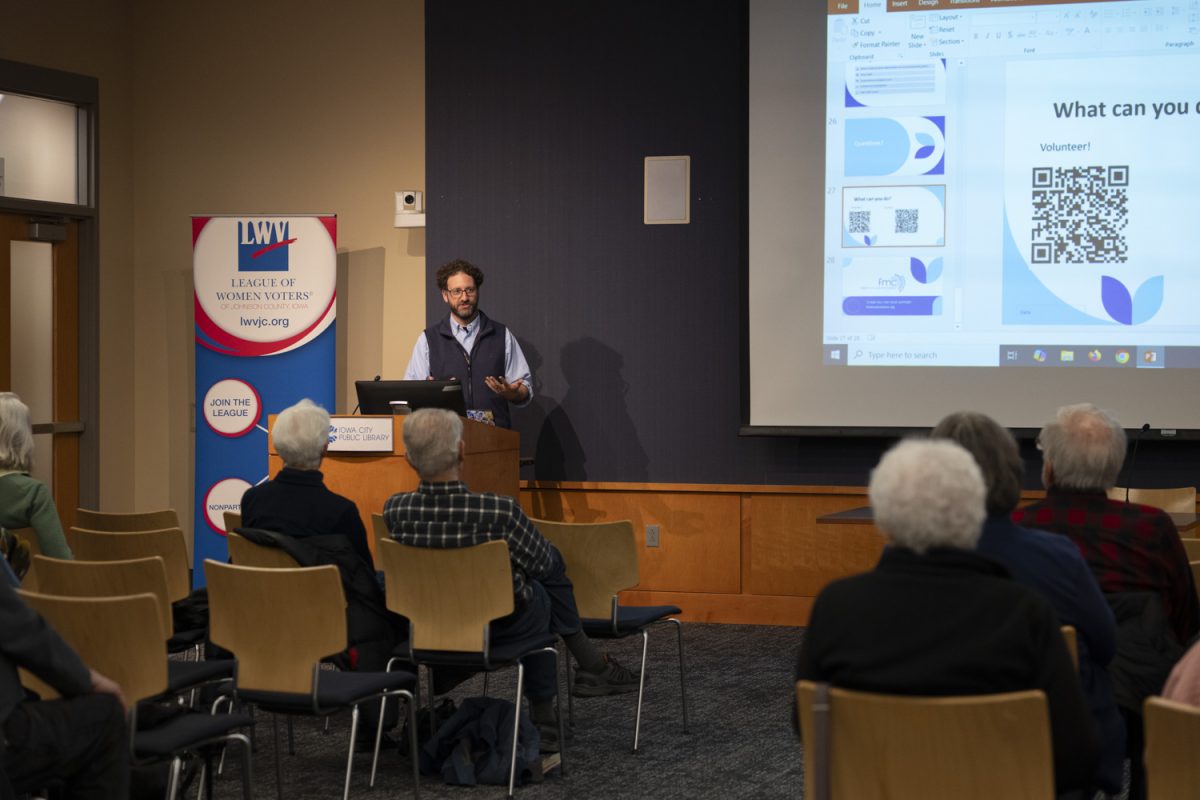Following recent anti-immigration legislation passed at the state level including House File 946, which requires law enforcement to assist in immigration law enforcement, the safety of immigrants in Johnson County has been at risk.
In response to the lacking awareness surrounding the issues facing immigrant communities, the League of Women Voters of Johnson County organized a forum focusing on the medical and legal issues that immigrants face in Johnson County.
The League of Women Voters is a nationwide, nonpartisan, and grassroots organization that protects and expands voting rights through advocacy, education, and litigation. Part of its programming include educating the public on influential policy issues during elections, with immigration being described as a “very important” issue by 61 percent of all voters in the 2024 presidential election.
“It’s not that there aren’t a lot of sources of information about [immigration]. It’s just increasingly those sources of information are biased and don’t necessarily report what people need to know if they’re going to the polls,” Rebecca Conrad, a member of the education committee for the League of Women Voters of Johnson County, said.
The forum’s goal was to inform the public about the issues immigrants face rather than provide information about resources available to the immigrant community, as explained by Laurie Wess Peters, a member of the education committee and moderator of the forum.
“Probably many of us in the community, we don’t have first-hand knowledge and experiences,” Wess Peters said. “And so, it really is an educational informational for people like us who live here and hear about it, but we really don’t know enough about it to form very good knowledge-based decisions.”
The forum included commentary from Bram Elias, a clinical professor of law and director of the University of Iowa Immigration Clinic, and Jennie Schmidt, the executive director of the Free Medical Clinic.
Schmidt discussed the medical issues facing the immigrant community, many of whom Schmidt said are disproportionately uninsured regardless of their legal status.
One of the main barriers to medical care among the immigrant community is cost due to an over-representation in low-wage jobs without healthcare benefits. Schmidt said immigrants are also excluded from non-emergency Medicaid, Medicare, and CHIP without a legal status.
The exception includes emergency Medicaid, which states must provide regardless of citizenship status, though “emergency” doesn’t have a specific definition.
“One of the complications there is you might think you have an emergency condition, and you don’t, and so sometimes can result in a bill, so that can often be a huge barrier, is just fear of this bill,” Schmidt said. “That’s a really unsettling fear for anyone, especially if you don’t speak English, or you’re not here with legal status, you’re very insecure.”
Other barriers to medical assistance include fear of immigration enforcement, discrimination, being shamed, the health care system — language, transportation, confusion about eligibility, and prior adverse treatment.
Elias continued after Schmidt, using Schmidt’s slides to emphasize the way terms and categories for immigrants, like “migrant,” “refugee,” and “asylum seekers,” can be used as barriers to access to legal and medical services. Further, Elias said confusion around terms like “qualified aliens,” which isn’t defined in immigration law but instead in welfare law, complicate legal cases around immigration due to a lack of definite understanding of what constitutes as “qualified.”
“Medicaid will look at you like, ‘How do you not know your own immigration status? Are you qualified or not?’” Elias said. “If you think immigrants have a hard time navigating government systems because of language barriers, I assure you, those administering governments also have language barrier problems.”
The legal issues that arise from the confusion around language describing immigrants and indeterminate statuses include complications receiving Medicaid, driver’s licenses, employment, banks, student loans, and public benefits.
“When folks are in indeterminate status, it’s very hard to navigate society, even if people are trying to help because no one can quite figure out what you are,” Elias said. “And the current administration is doing a very effective job of keeping people in indeterminate status longer.”



